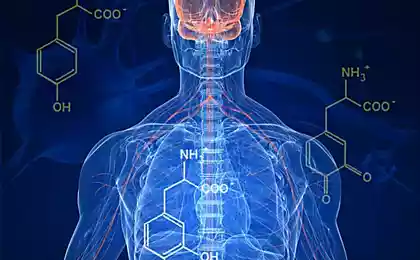542
About manic fashion for success
I want to write about the trend, which greatly affects the state of mind, I think. This mania "success" - a type of disorder today psihiki.Kakov image of a successful and prosperous man? He's always good mood, he was not discouraged, he does not bother. It is self-fulfilling every minute of his life, constantly generates creative ideas and interprets and comments on everything he sees.
Many people are guided by this condition as normal, eager to be there, "to be successful." And any loss of this state is assessed as negative - something, they say, is wrong with me.
So today was dominated by mania (MS) - elevated mood, acceleration of associative processes and motor activity, the constant pursuit of activities. Modern man must always be the best - revaluation of the self is also included in the MS.
Of course, in its extreme form of acute or very few people can attract - is severe psychotic conditions that occur in serious mental and physical disorders. The mild severity - it is almost a standard of happiness for the modern man.
This "norm" is promoted in the media and advertising, is cultivated in youth subcultures, where it is fashionable to be constantly on the drive. The image of the modern businessman also appears in popular culture mania - a tireless, constantly on the move, seething ideas.

And, it would seem, what's the problem? We all, like, want to be happy and successful. And it is quite natural that in order to achieve that happiness is more suitable way of cheerful, active, savvy person than splenetic slacker. And here is a trick - our thinking is often polar. We think in extremes - if not active, you slacker. If you are not happy, then miserable. If you do not think fast, something stupid. If you are not creative, it is worthless. Whereas apart from the extremes there is always a third option - the best. Or even a lot of options - individual.
What is the third embodiment of this optimum relative to manic? It is, in fact, normotimicheskoe state - normal, simply. This is when a person has flat calm mood, but not when all the drum. The person experiences emotions that fit the situation. If the situation has, then he is satisfied, fun, joy, even happy. If the situation is unfavorable, he feels sadness, fear, frustration, etc. I mean not only the situation, but also the internal state. After all, sometimes within us all is not well in terms of tone - fatigue, doubt, uncertainty, weakness, stupor - it is normal, because life requires us to inner development. And development is often accompanied by a crisis.
When we talk about negative emotions and low mood, then we come to a fine line - how to distinguish a negative state within the normal range of depressive? I would suggest that such a criterion - how people cope with adverse situations and conditions? If he successfully overcomes them, if they do not knock him out of a rut for a long time, the question of the norm. If a person applies to the problems of passive feeling of powerlessness, making negative predictions did not find a way out - then we can talk about what his mood is moving toward depression.
Why is it dangerous to navigate to the "success" as the norm?
Many people are guided by this condition as normal, eager to be there, "to be successful." And any loss of this state is assessed as negative - something, they say, is wrong with me.
So today was dominated by mania (MS) - elevated mood, acceleration of associative processes and motor activity, the constant pursuit of activities. Modern man must always be the best - revaluation of the self is also included in the MS.
Of course, in its extreme form of acute or very few people can attract - is severe psychotic conditions that occur in serious mental and physical disorders. The mild severity - it is almost a standard of happiness for the modern man.
This "norm" is promoted in the media and advertising, is cultivated in youth subcultures, where it is fashionable to be constantly on the drive. The image of the modern businessman also appears in popular culture mania - a tireless, constantly on the move, seething ideas.

And, it would seem, what's the problem? We all, like, want to be happy and successful. And it is quite natural that in order to achieve that happiness is more suitable way of cheerful, active, savvy person than splenetic slacker. And here is a trick - our thinking is often polar. We think in extremes - if not active, you slacker. If you are not happy, then miserable. If you do not think fast, something stupid. If you are not creative, it is worthless. Whereas apart from the extremes there is always a third option - the best. Or even a lot of options - individual.
What is the third embodiment of this optimum relative to manic? It is, in fact, normotimicheskoe state - normal, simply. This is when a person has flat calm mood, but not when all the drum. The person experiences emotions that fit the situation. If the situation has, then he is satisfied, fun, joy, even happy. If the situation is unfavorable, he feels sadness, fear, frustration, etc. I mean not only the situation, but also the internal state. After all, sometimes within us all is not well in terms of tone - fatigue, doubt, uncertainty, weakness, stupor - it is normal, because life requires us to inner development. And development is often accompanied by a crisis.
When we talk about negative emotions and low mood, then we come to a fine line - how to distinguish a negative state within the normal range of depressive? I would suggest that such a criterion - how people cope with adverse situations and conditions? If he successfully overcomes them, if they do not knock him out of a rut for a long time, the question of the norm. If a person applies to the problems of passive feeling of powerlessness, making negative predictions did not find a way out - then we can talk about what his mood is moving toward depression.
Why is it dangerous to navigate to the "success" as the norm?
- First, constantly elevated mood and increased activity is not always economically justified - it is part of life "beyond its means" mentality. The forces of the body and the mind is limited. Increased activity, if you do not stop in time, and is fraught with physical and mental exhaustion. In a state of exhaustion it is certainly not up to the effectiveness and creativity.
- Second, if we require from you in a good mood, you have to deny and suppress negative emotions. But in any activity we are faced with problematic situations when it is appropriate to feel anxiety, depression, sadness, frustration, etc. Problems will be denied, and the emotions will not live, and suppressed. Also to be ignored, such as the natural state of fatigue, lethargy, confusion - the brain simply will not have time to process information, to complete the work and rest.
So, if you cultivate manikalnoe state as the norm, it is possible to come to an internal conflict, neurosis. Another thing is that sometimes neurosis - is not the result of excessive demands to the status and reason. Fashion for manic with particular zeal pick people who already something a reject, forbid themselves to be different - including the weak, sad, and just relaxed. And here we come to the third contraindication.
- In the third place, each person has its own constitution, his temperament, his character. So, everyone has their own internal rate of activity and mood. Someone mental processes faster, someone slower someone stable, someone unstable - a psychophysiological given each of us. And this reality has the character and diverse personal features are imposed. And if they do not have a constant cheerfulness, we have to force yourself, to abuse the resources of the body for the sake of compliance with the newly-minted "norm". It's a matter of self-acceptance and his innate and acquired features.
Author: Psychologist Daniel Gulyaev
See tkzhe:
His age
20 things you should know in 20 years
via danilling.livejournal.com/48429.html
- In the third place, each person has its own constitution, his temperament, his character. So, everyone has their own internal rate of activity and mood. Someone mental processes faster, someone slower someone stable, someone unstable - a psychophysiological given each of us. And this reality has the character and diverse personal features are imposed. And if they do not have a constant cheerfulness, we have to force yourself, to abuse the resources of the body for the sake of compliance with the newly-minted "norm". It's a matter of self-acceptance and his innate and acquired features.























